- Home
- Newt Gingrich
Collusion Page 5
Collusion Read online
Page 5
When it came to assessing Garrett, Mayberry had the upper hand. She’d studied his FBI file, at least the pages available to her. She’d read about his Arkansas roots. His father’s alcoholism. How his parents had been killed when his father crashed their car while drunk. How Garrett had refused baseball scholarship offers. Choosing the United States Naval Academy. Multiple tours in Afghanistan. SEAL training. His last assignment: the CIA’s Special Activities Division, Special Operations Group—the most secretive special operations force in the country. No one made it to that level without being mentally and physically tough. It was difficult to separate SEALs from the movie stereotypes: married to work. More at ease playing flip-cup and bench-pressing with their bros than spending a night at a Kennedy Center performance or learning to discern the five characteristics of a fine pinot noir. Unable to commit to more than a one-night stand. Uncommunicative. Sentences in grunts. Obedient to orders. Love of country. Based on Garrett’s close-cropped military haircut, signs of a broken nose, and muscular build, he checked all the predictable boxes. Certainly, he was nothing like her Noah, who hadn’t been in a physical altercation since fourth grade, when he’d gotten his nose bloodied by a bully. Mayberry tried to look behind the Hollywood clichés. Like him, she was searching for clues. His face betrayed nothing. His background records showed that Cameroon had been a tipping point in his life. He’d been on a career fast track that had run off the rails in Africa. He’d had a fiancée, but after that, she’d left him. He’d begun seeing a psychiatrist and then had disappeared for several months. No one had known where he’d gone. And then he’d resurfaced, and Kim had hired him.
“Pleasure to meet you, Mr. Garrett,” Mayberry said, releasing his hand.
“Likewise,” he replied.
“Let’s take this conversation into my inner sanctum,” Kim suggested, leading them between the two secretaries’ desks toward a solid, stainless-steel door. Kim touched a biometric fingerprint door lock and stepped aside, allowing Mayberry to enter first.
Unlike the pristine, Spartan outer office, Kim’s “sanctum” was in disarray. Piles of papers stacked in rows on the royal blue carpet. Two golf bags. A dead plant. Books with yellow paper slips jutting from their pages. On the wall to their left were a dozen flat-screen monitors showing muted news channels. On their right was a massive floor-to-ceiling window made of specialty glass that was both bullet resistant and (through advanced technology that IEC had patented) impenetrable to outside snooping devices. Positioned behind Kim’s desk, which they were now facing, were photos of Kim with Washington dignitaries and entertainment celebrities. Three computer screens were positioned on his desk with yellow reminder sticky notes in English and Korean stuck along their edges. Two desk items caught Mayberry’s eye. The first was a Big Lebowski talking bobblehead doll. Actor Jeff Bridges molded in plastic. “I do mind. The Dude minds!” it declared in a recording of Bridges’s voice when Kim dropped his clasped hands onto his desktop, causing it to shake. Next to Kim’s ten-dollar re-creation of the Los Angeles slacker was what appeared to be a live hand grenade.
“Reminders,” he said, nodding at the grenade and plastic Dude.
“Of what?” she asked.
“The absurdity and fragility of life.”
Garrett showed a half smile. “He just likes his toys.”
Mayberry chose the only seat facing the desk without papers on it. Garrett shoved the papers from another chair.
“What brings you here, Agent Mayberry?” Kim asked.
Mayberry removed a photograph from her front-flap satchel.
“This is Gabriel de Depardieu. A Frenchman. Do either of you recognize him?”
Kim gave a shake of his head no.
“He’s the dead terrorist,” Garrett said. “The last time I saw him, he was prone on a marble floor in Kiev.”
“Did you ever see him before the terrorist attack? Loitering outside the foreign ministry—before the press conference? Entering the building?”
Garrett thought back to that morning. Waiting outside in the chase car for Don Marks to take his cigarette break, slipping the Suboxone tabs under his tongue. Was it possible he’d missed something?
“Mr. Garrett,” she said in a demanding voice. “Did you see anything suspicious?”
“Agent Mayberry, I did not see three men carrying Kalashnikovs walk into the ministry wearing black ski masks.”
Kim said, “The terrorists were probably already inside when Ambassador Thorpe arrived. Any lapse in security was on the Ukrainians’ part, not my people. They’re all ex-military. Highly trained and excellent at their jobs.”
“Then why didn’t you and the other private guards go into the building to help protect Ambassador Thorpe?” she asked.
Garrett didn’t like her tone. “We were told to remain in our cars. You’ll have to ask the RSO why—that’s shorthand for regional security officer.”
“I know what an RSO is,” she said.
He assumed that she did but had said it anyway.
“It might interest you to know the RSO told our agents in Kiev that Ambassador Thorpe didn’t want any IEC employees inside because of you. He was afraid someone in the media might recognize you.”
“Hold on,” Kim said. “Garrett isn’t to blame. If anything, he was a hero in Kiev.”
“Just being thorough and factual,” she said, staring at Garrett, waiting for him to react.
“If that’s what the RSO said, that’s what he said,” Garrett replied. “And if he said that, he is even more stupid than I suspected. If we had been inside, Ambassador Thorpe might still be alive.”
“When the shooting began,” she continued, “everyone inside panicked and began running toward a side exit—”
“No,” Garrett said, interrupting. “Not everyone ran toward the exit.”
She seemed confused.
“Ambassador Thorpe, Ukraine’s foreign minister, two State Department protective detail employees, and John Harper didn’t go anywhere because they were dead,” he said.
She frowned. “The three terrorists didn’t exit through the ballroom’s rear doors. Instead, they used an unmarked exit across the room from the side doors, isn’t that correct?”
“Mahogany,” Garrett said. “The entire interior wall was covered with mahogany panels. Post–World War Two construction. The only indication an exit door was there was its doorknob.”
“Which explains why the crowd didn’t run toward it,” she said. “Yet the terrorists knew about it. Moving on, neither you nor any of the other IEC private security guards were watching that exit, were you?”
“We arrived at the front of the ministry. From that vantage point, there was no visible gap between it and the buildings next to it. That door—the one the terrorists used—was located at the back of the ministry. It opened into a narrow walkway where trash cans were kept. None of us could have seen it.”
“But you would have seen it if your team had stationed someone at the back side of the ministry, rather than having everyone sit outside the front entrance.”
Addressing Kim, Mayberry said, “Isn’t it standard practice for IEC security guards to be aware and cover every possible entrance and exit when an ambassador enters a building overseas? Seems rather rudimentary.”
“Why are you trying to blame this on Garrett and my IEC guys?” Kim asked, clearly offended.
“I’m not blaming anyone. I’m simply trying to understand what happened. If Mr. Garrett and your people made mistakes, then we need to know what they were.”
“Your buddies at Dulles said I would be debriefed later,” Garrett said. “I’ve never been debriefed by a single FBI agent. You guys always travel in pairs. So why are you really here?”
Mayberry reached into her satchel and removed a photo of Aysan Rivera. “Did you ever see this woman in Kiev?”
Garrett studied Rivera’s enlarged passport photo.
“Who is she?” Kim asked.
“That doesn’t matter.”
She tucked the photo back into her bag.
“Are you certain the three assailants were men?” she asked. “Weren’t they all wearing ski masks?”
“I only saw two of them well,” he said. “I saw the dead one and the one I shot in the arm who dropped his buddy and fled. The third one had already exited when I entered the ballroom, so I can’t fully answer your question.”
“Mr. Garrett, let’s assume you were one of the terrorists. Would you have been the first out the door or would you have stayed behind and provided cover fire while your wounded buddy was being helped through it?”
“I’m not a terrorist.”
“I’m asking for your opinion.”
“I thought you wanted facts,” he replied.
She sighed. “Call it analysis, then.”
“Someone with professional military training, who hadn’t been wounded, would have provided cover fire. Unless his assignment was to be the first one out of the building to put down any security guards waiting for them.”
“There’s a third explanation,” Mayberry said. “If the first terrorist was a woman, she might be used to going through doors first.”
“Seems like a stretch,” he said. “You did ask for my opinion.”
“You don’t open doors for women?”
“Not when I’m shooting people.”
Kim joined their Q-and-A. “Can’t you tell from security tapes if one of the terrorists was smaller than the others?”
“Not all women are petite,” Mayberry said.
“Or tactful,” Garrett added.
Mayberry picked up her satchel. “Gentlemen, thank you for your time. Because this is an ongoing investigation, please keep our discussion private.”
Kim rose from behind his desk. “I didn’t hear nothing that was said.” He pushed an app on his watch, unlocking and opening his electronically controlled office door.
She started toward the door but stopped.
“Is there something else, Agent Mayberry?” Kim asked.
“‘I didn’t hear nothing?’ You used a double negative.”
“English is my second language,” Kim replied, smiling. “I prefer Korean.”
After she was gone, Garrett said, “You prefer Korean? What was that about?”
“Mayberry’s smart,” he replied.
“And where does that get her?” Garrett asked.
“Some people like that in a woman. Especially a hot one.”
Ten
The presidential limousine, aka “the Beast,” rode northeast from the White House en route to the Basilica of the National Shrine of the Immaculate Conception. Ambassador Stanford Thorpe’s funeral was today, three days after his assassination.
“Our best can’t open the flash drive,” CIA director Harold Harris said.
“Brett Garrett hasn’t a clue?” President Randle Fitzgerald asked.
“None.”
“Where’s Garrett now?”
“Cooling his heels in his Rosslyn condo.”
The president gazed through the heavily tinted passenger window. “I’ve never liked funerals.”
“No one does, sir.”
“Especially when one of the bastards attending either knows or was involved in murdering Thorpe. I’m talking about the Russians.”
“Knowing and proving, sir,” Harris replied.
The day was overcast, and the president had awakened in a foul mood. A murdered ambassador. It made him look weak. It made America look weak. The Brits might have bodies of former Russian spies poisoned by the Kremlin stacking up, but America was not Great Britain. He needed to put an end to this—now. Or another attack would happen.
He glanced forward as his motorcade entered the basilica’s manicured grounds. President Fitzgerald was Southern Baptist. He didn’t know much about the basilica or really care. He’d never bothered to tour it or learn it was the largest Catholic church in not just the United States but all North America, one of the ten largest churches in the world, and the tallest habitable building in Washington, D.C. Just the same, it was not the nation’s official “National House of Prayer,” an honor bestowed by Congress on its religious rival, the Washington National Cathedral, a neo-Gothic Presbyterian church where the funerals for most prominent national luminaries, including presidents, usually were held.
“Didn’t see Thorpe as Catholic,” Fitzgerald said as the motorcade stopped outside a side entrance.
“A bit hard to picture him as an altar boy,” Harris replied in a soft voice.
“Now, now, let’s not talk ill of the dead,” Fitzgerald said, chuckling.
The president was seated inside. Next to Thorpe’s only son and relatives. In chairs placed in front of the church’s permanent wooden pews. Closer to the altar. After a priest blessed the casket and sprinkled it with holy water, an organist began playing “O God, Our Help in Ages Past” and President Fitzgerald’s mind wandered. He thought about his own funeral, and who would attend it. Probably depended on how far he was from power when he passed. By the time the organist had finished, he had moved on. Russia. What could he do?
It became apparent that he would have plenty of time to ponder options. The full mass dragged on for two long hours, during which time the president nervously tapped his foot. He had work to do. Finally, a liturgist, under the watchful eyes of his eminence the archbishop of Washington, delivered a final send-off. “In peace let us take our brother to his place of rest.”
Thorpe’s son had requested privacy at the burial site—thankfully. No need for the president to go graveside. Outside, he shook hands with the son. Spoke obligatory words about how great Thorpe had been. How he had faithfully served his nation. Then back inside the church. By the time the hearse pulled away, a reception line had formed. Washington was returning to the now. Press flesh. Cut deals. Plot. Conduct the nation’s business. No matter how great the fallen, they were the past and pushed to the side.
Secret Service agents separated dignitaries from curiosity seekers at the reception doorway. Only foreign diplomats, members of Congress, other senior government officials, and lobbyists were allowed inside where the president was holding court.
President Fitzgerald was a big man. Once handsome, now with drooping jowls. Once an NFL quarterback. Twice MVP. Once in shape. No longer. Being a quarterback required quick decision making. He’d retained that ability. He was from an era when a handful of quarterbacks still called plays. They were team leaders. He was one of them. He wasn’t a follower. His football fame led to an easy election win, first into the House, next the Senate, representing the good people of New Hampshire. Finally, the White House. At age sixty-seven, he remained a dominating presence. A Washington reporter had compared the president’s blue eyes to the color of a calm mountain lake on a chilly winter morning and his temper to that of an angry charging bull wounded with banderillas. A bit too flowery, but Fitzgerald had loved it.
A State Department aide stood behind him at the reception, whispering names of foreign dignitaries approaching in the receiving line. He needed no reminder when he noticed Yakov Prokofyevich Pavel, Russia’s deputy minister of foreign affairs.
“Mr. President, I was there in Kiev,” Pavel said, shaking the president’s hand. “As a guest attending the news conference.”
“Clearly you weren’t a target,” Fitzgerald replied.
“Yes, I was most fortunate. My bodyguards shielded me, and we were seated close to the side exit. But enough about this horrible event.” Pavel leaned in close and whispered: “A good glass in the bishop’s hostel in the devil’s seat. It’s the password to the flash drive.”
Fitzgerald said loudly, “Thank you.”
The Russian diplomat continued down the receiving line.
Back in “the Beast,” returning to the White House, President Fitzgerald and Director Harris analyzed what had happened.
“Yakov Pavel made a point of telling me that he had been in Kiev at the pre
ss conference,” Fitzgerald said. “Next, he told me a password for the flash drive.”
“The natural conclusion is that Pavel gave the flash drive to Ambassador Thorpe in Kiev before he was murdered and now Pavel wants you to open it.”
The flash drive, an IT expert named Oscar Lopez, and a new portable computer freshly removed from its box were waiting for them. Harris had ordered a new computer be brought to the White House. Its network connectivity had been disabled out of the box to prevent the building’s Wi-Fi from kicking in. He wasn’t going to risk inserting an unknown drive from the Russians into the White House’s system.
Fitzgerald and Harris watched as Lopez typed: “A good glass in the bishop’s hostel in the devil’s seat.”
Incorrect password.
He repeated it without spaces.
Incorrect password.
He tried no capitals.
Incorrect password.
He tried with all capitals.
Incorrect password.
“Mr. President,” Lopez said, “this password doesn’t appear to be working.”
“Try it again.”
He did. It didn’t work.
“I know what I heard,” the president grumbled.
“It’s a phrase,” Harris said. “Probably from a movie or poem. Oscar, please use a computer with Internet access to do a search.”
Lopez left them to use a different computer before returning moments later.
“It’s from ‘The Gold Bug,’ a short story by Edgar Allen Poe. The story contains a cryptogram that Poe challenged readers to decipher.”
“A cryptogram,” Harris repeated. “Pavel used an old Poe cryptogram as a password. Clever.”
“In the book, the cryptogram contained the directions to a buried treasure hidden by Captain Kidd. I’ve copied all the information about ‘The Gold Bug’ off Wikipedia.” He showed them a sheet of paper. “Here’s the actual cryptogram that Poe’s readers had to decipher.”
53‡‡†305))6*;4826)4‡.)4‡);806*;48†8

 1945
1945 Collusion
Collusion Trump's America
Trump's America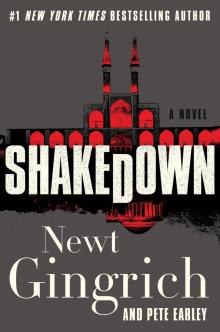 Shakedown
Shakedown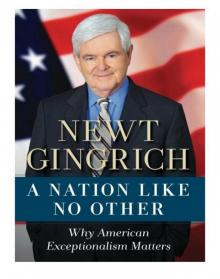 A Nation Like No Other
A Nation Like No Other To Try Men's Souls - George Washington 1
To Try Men's Souls - George Washington 1 Pearl Harbor: A Novel of December 8th
Pearl Harbor: A Novel of December 8th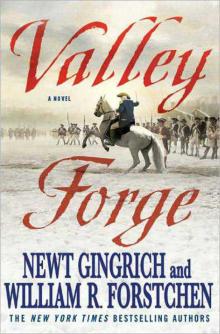 Valley Forge: George Washington and the Crucible of Victory
Valley Forge: George Washington and the Crucible of Victory To Save America
To Save America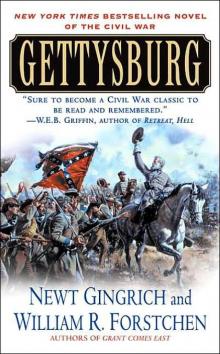 Grant Comes East cw-2
Grant Comes East cw-2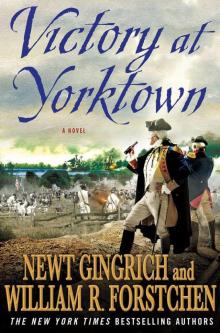 Victory at Yorktown: A Novel
Victory at Yorktown: A Novel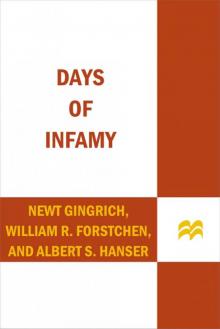 Days of Infamy
Days of Infamy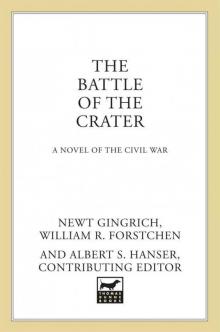 The Battle of the Crater: A Novel (George Washington Series)
The Battle of the Crater: A Novel (George Washington Series)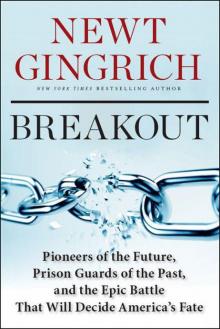 Breakout: Pioneers of the Future, Prison Guards of the Past, and the Epic Battle That Will Decide America's Fate
Breakout: Pioneers of the Future, Prison Guards of the Past, and the Epic Battle That Will Decide America's Fate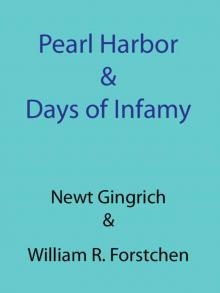 Pearl Harbour and Days of Infamy
Pearl Harbour and Days of Infamy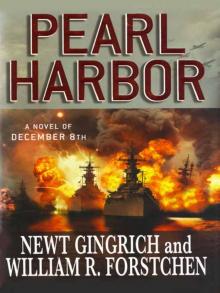 Pearl Harbour - A novel of December 8th
Pearl Harbour - A novel of December 8th Understanding Trump
Understanding Trump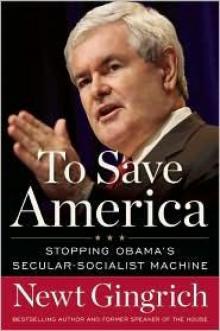 To Save America: Abolishing Obama's Socialist State and Restoring Our Unique American Way
To Save America: Abolishing Obama's Socialist State and Restoring Our Unique American Way